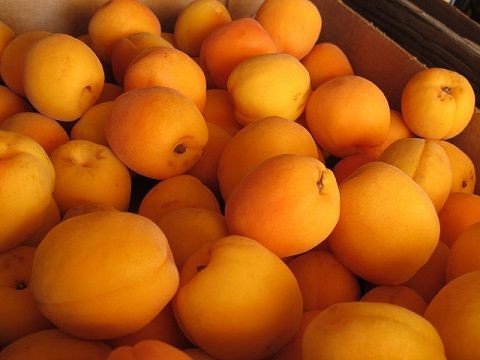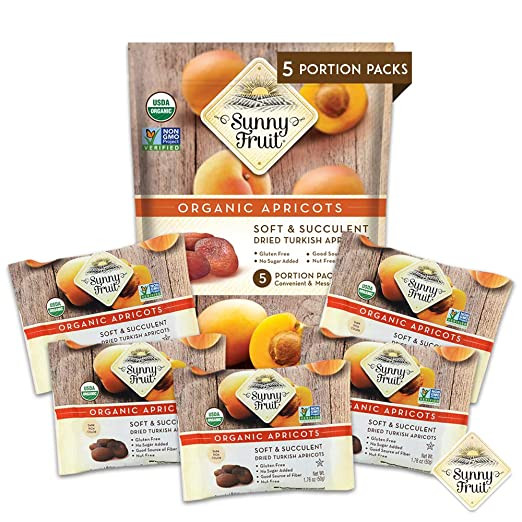Apricot Nutrition: 3 Surprising Health Benefits Of Apricots

Don't let their tiny size fool you. With low fat and plenty of fiber, apricots are packed with ample doses of other essential vitamins. With one (raw) serving totaling only about 60 calories, apricots may deserve a little more attention.
Approximately 90 percent of apricots are grown in the United States and come from California. Apricots originally came from China, and then made their way into the Persian Empire and onto the Mediterranean. There, they flourished. Later, Spanish explorers introduced the fruit to the New World, specifically to California, where apricots were planted in the gardens of Spanish missions. The first major recorded production of apricots dates to 1972, south of San Francisco.
Find out more about apricot nutrition and why this fruit can be good for your health — raw, dried, or cooked.
When is Apricot Season?
Apricot season runs very short — from about the end of May or mid-June to mid-July.
How Do You Store Apricots?
Apricots should be stored at room temperature until ripe and then kept in the fridge in a plastic bag or bin for three to five days. When storing, be sure to keep them out of direct sunlight.
How can you tell when apricots are ripe? One sign: the fruit is soft but not too soft; otherwise it may be overripe. Consider when you plan to eat or cook the apricots, and let that determine what's too firm or soft. Learn more about how to store apricots.
What About Dried Apricot?
Dried versus raw? Which is better, or are they equal? Fruit loses most of its water content through the drying process, so it takes 3 to 4 lbs. of fresh fruit to produce 1 lb. of dried fruit.
Dried fruit offers some benefits to fresh fruit: convenient, keeps well, and quick energy boost. Research suggests that dried fruit provides rich sources of dietary fiber and iron — particularly figs, raisins, dried plums, and apricots. By replacing a few servings of fresh fruit a week with smaller portions of dried fruit, you can work to increase your intake of dietary fiber, potassium, iron, and antioxidants.
Warning: since it is higher in sugar, dried fruit can be bad for your dental health if you eat too much. Reduce your risk of cavities by consuming dried fruit at mealtimes, rather than as a snack, and either rinsing with water or brushing your teeth immediately after eating.
Health Benefits of Apricots
Vitamin A
Apricots are a great source of vitamin A, which you've probably heard about before — good for eyesight, right?
But what is vitamin A exactly and how much do you need? A fat-soluble vitamin that's naturally present in many foods, vitamin A is important for normal vision, proper immune system function, reproduction, and maintaining healthy skin, teeth, and skeletal and soft tissue.
There are two different types of vitamin A. The first type, preformed vitamin A, is found in meat, poultry, fish, and dairy products. The second type, provitamin A, is found in fruits, vegetables, and other plant-based products. The most common type of provitamin A in foods and dietary supplements is beta-carotene.
While research is ongoing, studies examine how vitamin A may play a role in the prevention of cancer and age-related eye disorders. Women are recommended to consume 700 micrograms of vitamin A each day; men should aim for 900 micrograms. A 1-cup serving of apricot slices contains 158 micrograms.
Potassium
Apricots provide a significant source of potassium. Potassium is a mineral and electrolyte that helps you maintain proper fluid balance, aids in muscle function, and helps regulate heartbeat. Potassium also promotes healthy digestion and strong bones. Getting sufficient amounts of potassium each day can help you maintain normal blood pressure and might reduce your risk of having a stroke.
The average adult should get 4.7 grams (4,700 mg) of potassium per day. A 1-cup serving of sliced apricots supplies 427 milligrams of potassium toward your daily requirement.
Fiber
Apricots contain significant amounts of both insoluble and soluble fiber, but are especially high in soluble fiber, which promotes and helps maintain healthy blood glucose and cholesterol levels.
A 1-cup serving of sliced apricots (approximately four-and-a-half fruits) provides about 79 calories and 3.3 grams of fiber. The Mayo Clinic recommends that women age 50 or younger consume 25 grams of fiber a day; men, aged 50 or younger, should consume 38 grams per day.
Tips for Picking Apricots
- Buy fresh. Opt for in-season apricots — late spring through the summer — which are grown in the U.S. Out-of-season (winter) apricots have to get shipped from other countries and, to make the long journey, these apricots have to be picked when they're under-ripe, which means they're more likely to contain less flavor.
- Choose carefully. Examine each apricot for plumpness and a golden, or orange-red, color. Avoid apricots that are green or pale yellow, or that are bruised or shriveled.
- Give them a sniff. An apricot that has flavor also has a sweet and ready fragrance.
Discover some ways to get creative with apricots.

Dried Apricots on amazon : Check Price
Source: Vinson J, Zubik L, Bose P, Samman N, Proch J. Dried Fruits: Excellent in Vitro and in Vivo Antioxidants. Journal of the American College of Nutrition. 2003.



























